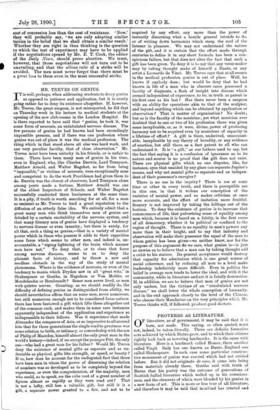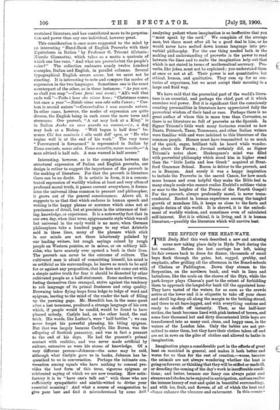PROVERBS AS LITERATURE.
OP literature, as of government, it may be said that it is born, not made. This saying, so often quoted, must not, indeed, be taken literally. There are definite formative acts achieved by which States grow, and to which their citizens rightly look back as towering landmarks. It is the same with literature. Here-is a landmark called Homer, there another called Virgil. Italy has one known as Dante, England one called Shakespeare. In each case some particular construc- tive monument of genius was erected which had not existed before. But it did not originate de novo, it came into being from materials already there. Goethe said with truth of Burns that his poetry was the outcome of generations of Scottish ballad literature which welled up in his conscious- ness, and the elements of which were blended by his genius in a new form of art. This is more or less true of all literature, and therefore it may be said that mankind has created and
sustained literature, and has contributed more to its perpetua- Gan and power than any one individual, however great.
This consideration is once more suggested to the mind by an interesting Hand-Book of English Proverbs with their Equivalents in Italian "by Professor G. Tricomi (Catania: Niccolo Gituanotta), which takes as a motto a quatrain of which one line runs, "And what are proverbs but the people's voice?" The collection embraces nearly twelve hundred examples, Italian and English, in parallel columns. Several typographical English errors occur, but we must not be exacting. It is interesting to note and compare the modes of expression in the two languages. Sometimes one is the exact counterpart of the other, as in these instances : "As you sow, so shall you reap "—Come faral cosi avrai ; "All's well that ends well "—Tatto e bene che riesce bene ; "Christmas comes but once a year "—Natale viene una sola volta l'anno ; " Cus- tom is second nature "—Consuetudine e una seconda natura. In other cases, however, the modes of expression are quite diverse, the English being in such cases the more terse and strenuous. Our proverb, "A cat may look at a King," is in Italian Anche un cane guarda un vescovo,—i.e., a dog may look at a Bishop. "Well begun is half done" be- comes Chi ben comincia alla meta dell' opra, or "He who begins well is at the end of his work." The very terse "Forewarned is forearmed" is represented in Italian by Uomo avvisato, mezzo salvo. Uomo avvertito,mezzo munito,—"A man advised is half safe. A man warned is half secure."
Interesting, however, as is the comparison between the structural expression of Italian and English proverbs, our design is rather to suggest the importance of the proverb in the making of literature. For that the proverb is literature there can be no doubt. It is artistic in form, it is a concen- trated expression of worldly wisdom at least and very often of profound moral truth, it passes current everywhere, it formu- lates the universal ideas common to peasant and philosopher, it grows out of the general consciousness. Above all, it suggests to us that that which endures in human speech and writing is the happy phrase or sentence which aims not at preciseness of detail, but at precision in the utterance of feel- ing, knowledge, or experience. It is a noteworthy fact that in our own day, when that terse, epigrammatic style which was all but universal in the early world is no more, when German philosophers take a hundred pages to say what Aristotle said in three lines, many of the phrases which stick in our minds are not those laboriously polished by our leading writers, but rough sayings coined by rough people on Western prairies, or in mines, or on solitary hill- sides, who have scarcely ever opened a book in their lives. The proverb can never be the outcome of culture. The cultivated man is afraid of committing himself, his mind is as artificial as his surroundings, he knows so much to be said for or against any proposition, that he dare not come out with a simple native truth for fear it should be dissected by other cultivated people as a half-statement. Some modern writers, feeling themselves thus cramped, strive against the tendency to rob language of its primal freshness and crisp quality. Browning takes flying leaps from ledge to ledge of word and epigram, leaving to the mind of the reader the task of filling up the yawning gaps. Mr. Meredith has, in the same quest after a lost terseness, produced a strange language of his own which, if people would be candid, would be found to have pleased nobody. Carlyle had, on the other hand, the real trick. His words, like Luther's, were " half-battles " ; we can never forget his powerful phrasing, his biting epigram. But that was largely because Carlyle, like Burns, was the offspring of Scottish peasantry, and was in fact a peasant to the end of his days. He had the peasant's primal contact with realities, and was never made artificial by culture, extensive as were his stores of knowledge. Of a very different person—Johnson—the same may be said, although what Carlyle gave us in books, Johnson has be- queathed to us in conversation. Perhaps the intimate con. versation among equals who have nothing to conceal pro- vides the best form of this terse, vigorous epigram or celebrated saying of which we are now treating. How satis- factory it is to "have one's talk out" with those who are sufficiently sympathetic and nimble-witted to divine your essential meaning ! And what a source of exaaperation to give your best and find it misunderstood by some dull analysing pedant whose imagination is so ineffective that you must speak by the card." We complain of the average man, but there must after all be a good deal in him, or he would never have melted down human language into pro- verbial philosophy. For the one thing needed both in the snaking and understanding of proverbs is the power to read between the lines and to make the imagination help out-that which is not stated in terms of mathematical accuracy. Pro- verbs, like jokes, must not be explained ; you understand them at once or not at all. Their power is not quantitative, but ethical, human, and qualitative. They suns up for us cen- turies of experience, but we must accept their meaning in a large and fluid way.
We have said that the proverbial part of the world's litera- ture is an essential, and perhaps the chief, part of it which exercises real power. But it is significant that the consciously creating personalities in literature have appreciated fully the proverbial wisdom of their land or race. Perhaps there is no great author of whom this is more true than Cervantes, as there is no literature so full of proverbs as the Spanish. In Signor Tricomi's little work many footnotes remind us how Dante, Petrarch, Tasso, Tommaseo, and other Italian writers were familiar with and were indebted to this literature of the common people. Horace must have transmitted to us much of the quick, eager, brilliant talk he heard while wander- ing about the Forum; Juvenal certainly did, as Signor Tricomi's notes show. Shakespeare's mind was filled with proverbial philosophy which stood him in higher stead than the "little Latin and less Greek" acquired at Strat- ford Grammar School. Bacon is debtor to the proverb, and so is Bunyan. And surely it was a happy inspiration to include the Proverbs in the sacred Canon, for how much more human and even helpful they make the Bible feel to many simple souls who cannot realise Ezekiers sublime vision or soar to the heights of the Proem of the Fourth Gospel! For the proverb, always profoundly moral, is never trans- cendental. Rooted in human experience among the tangled growth of mundane life, it keeps us close to the facts and simple duties of this world. It is shrewd, it is the embodi- ment of worldly wisdom, and sometimes even of calculated self-interest. But it is ethical, it is living, and it is human literature,—possibly the literature which will survive best.



































 Previous page
Previous page